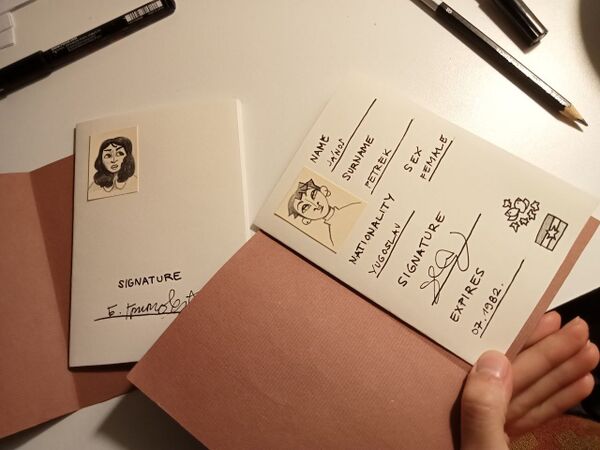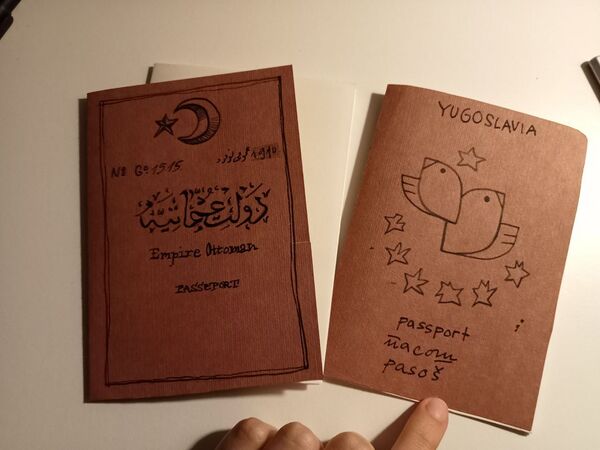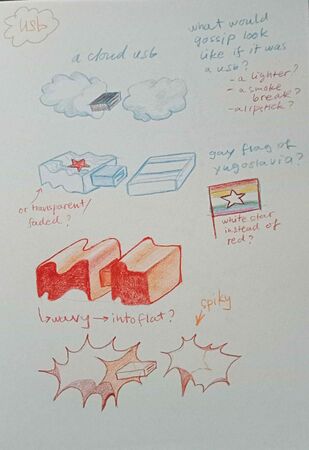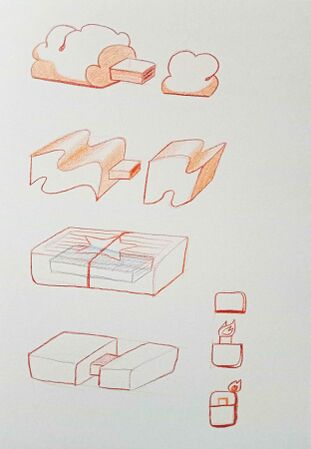User:Senka/Project Proposal: Difference between revisions
| Line 13: | Line 13: | ||
* Critical fabulation (Saidiya Hartman’s method which uses historical information, archival material and fiction to do reparative work in the archives.) | * Critical fabulation (Saidiya Hartman’s method which uses historical information, archival material and fiction to do reparative work in the archives.) | ||
* Imagination exercises: Since I will be exploring what the political imaginary of queerness in the Balkans could be, I want to facilitate what I’m calling ‘imagination exercises’ and indulge in fictioning with others to see what kind of information the narrative could contain, and what kind of distribution is necessary. | * Imagination exercises: Since I will be exploring what the political imaginary of queerness in the Balkans could be, I want to facilitate what I’m calling ‘imagination exercises’ and indulge in fictioning with others to see what kind of information the narrative could contain, and what kind of distribution is necessary. | ||
<gallery mode=packed heights=300px style="text-align:left;"> | |||
File:Passports.jpg | |||
File:Passports1.jpg | |||
</gallery> | |||
{| width=70% align=center | |||
|<pre style="border:1px solid black; background:#B4C5FF; color:black;"> | |||
Choose your own adventure passports for travelling through time instead of space. The player is always trans, and always gets stopped by passport security (even if they come from a different time.) </pre> | |||
|} | |||
I will be using the languages of HTML, CSS, JavaScript, alongside with open-source software such as Blender (for 3D modelling), and possibly Godot, Bitsy and Pico8 (for game design). <br> | I will be using the languages of HTML, CSS, JavaScript, alongside with open-source software such as Blender (for 3D modelling), and possibly Godot, Bitsy and Pico8 (for game design). <br> | ||
{{video|mp4=https://pzwiki.wdka.nl/mw-mediadesign/images/d/df/Disappearing_menu.mp4|style=width:100%|;}} | |||
{| width=70% align=center | |||
|<pre style="border:1px solid black; background:#B4C5FF; color:black;"> | |||
Disobediant interfaces that include friction in the narrative </pre> | |||
|} | |||
I want to use 3D to build worlds and tell stories through landscape in a less text-driven manner. I want to discover the potential of constructing counter-narratives (to those that exist about queer people) using more than words. I find digital 3D an ample medium to explore critical fabulation beyond words (that don't follow the hero narrative Ursula K. Le Guinn warns about in the Carrier Bag of Fiction theory). <br> | I want to use 3D to build worlds and tell stories through landscape in a less text-driven manner. I want to discover the potential of constructing counter-narratives (to those that exist about queer people) using more than words. I find digital 3D an ample medium to explore critical fabulation beyond words (that don't follow the hero narrative Ursula K. Le Guinn warns about in the Carrier Bag of Fiction theory). <br> | ||
I will have testing sessions with both queer and cishet people from the Balkans and people living in the Netherlands. Some of these sessions will be conducted online, and some in real life, to accommodate people living in either place. <br> | I will have testing sessions with both queer and cishet people from the Balkans and people living in the Netherlands. Some of these sessions will be conducted online, and some in real life, to accommodate people living in either place. <br> | ||
In terms of distribution, I want this project to reach many people and to be something that a person can deeply interact with 1 to 1. Somehow, I’m most driven to think it might work best in the comfort of one’s own home, although I would love to have it as a work that can be distributed through queer networks/initiatives. I would like it to combine a gallery set up and a more intimate form of distribution. <br> | In terms of distribution, I want this project to reach many people and to be something that a person can deeply interact with 1 to 1. Somehow, I’m most driven to think it might work best in the comfort of one’s own home, although I would love to have it as a work that can be distributed through queer networks/initiatives. I would like it to combine a gallery set up and a more intimate form of distribution. <br> | ||
<gallery mode=packed heights=300px style="text-align:left;"> | |||
File:Usb 1.jpg | |||
File:Usb.jpg | |||
</gallery> | |||
{| width=70% align=center | |||
|<pre style="border:1px solid black; background:#B4C5FF; color:black;"> | |||
USB design for possible 3D printing | |||
</pre> | |||
|} | |||
Still to be figured out: | Still to be figured out: | ||
Revision as of 12:06, 6 November 2024
What do you want to make?
My project is an interactive digital narrative about queer histories in the Balkans, something close to but not quite a game. The narrative will make use of non-normative or non-linear time (time-travel, loops in space-time) and 3D models, and will include text while not being solely text-driven.
Depending on the public's interactions with the work, different portable outputs of archival information will get distributed to the audience*. This output will be different based on each set of interactions (fluid changing publications).
The narrative would be screen-based, although the interaction with the screen would go beyond the keyboard, possible including a range of 3D printed gadgets the public can use to navigate.
- Either printed (on paper) for them to take, or shared as a custom 3D printed USB which only a handful of people will receive.
How do you plan to make it?
The storyline will start from the airport as a site where both national and gender identity are examined and put under scrutiny. The journey from there will include elements of a choose your own adventure game, and instead of travelling through space it will allow for travelling across time.
I will try to experiment with the following methods to write the narrative/storyline:
- Cybertext (In the sense that the medium of the narrative will be a defining way in which the story will be shaped, and it will require work from the reader to engage with interactive obstacles to fully experience it)
- Theory fiction (Writing that offers alternate ways of exploring and asking questions about relations between the fictitious and the actual world, it merges theory, philosophical concepts and fiction)
- Fictioning
- Critical fabulation (Saidiya Hartman’s method which uses historical information, archival material and fiction to do reparative work in the archives.)
- Imagination exercises: Since I will be exploring what the political imaginary of queerness in the Balkans could be, I want to facilitate what I’m calling ‘imagination exercises’ and indulge in fictioning with others to see what kind of information the narrative could contain, and what kind of distribution is necessary.
Choose your own adventure passports for travelling through time instead of space. The player is always trans, and always gets stopped by passport security (even if they come from a different time.) |
I will be using the languages of HTML, CSS, JavaScript, alongside with open-source software such as Blender (for 3D modelling), and possibly Godot, Bitsy and Pico8 (for game design).
Disobediant interfaces that include friction in the narrative |
I want to use 3D to build worlds and tell stories through landscape in a less text-driven manner. I want to discover the potential of constructing counter-narratives (to those that exist about queer people) using more than words. I find digital 3D an ample medium to explore critical fabulation beyond words (that don't follow the hero narrative Ursula K. Le Guinn warns about in the Carrier Bag of Fiction theory).
I will have testing sessions with both queer and cishet people from the Balkans and people living in the Netherlands. Some of these sessions will be conducted online, and some in real life, to accommodate people living in either place.
In terms of distribution, I want this project to reach many people and to be something that a person can deeply interact with 1 to 1. Somehow, I’m most driven to think it might work best in the comfort of one’s own home, although I would love to have it as a work that can be distributed through queer networks/initiatives. I would like it to combine a gallery set up and a more intimate form of distribution.
USB design for possible 3D printing |
Still to be figured out:
- How to connect to a printer and which printer will be the one?
- Possibly 3D printing and working with Arduino (if time allows for it)
What is your timetable?
Sept–Oct:
- Contact and meet with researchers
- Read like your life depends on it
- Write a myriad of research questions to further locate the exact one
- Get to know different printers better
Oct–Nov–Dec:
- Sketch physically, on paper or digitally using the Wacom.
- Afterwards, sketch and model scenes in Blender. (Start with the point of any travel (including one of into the past) - the airport. The places where identities of all kinds are policed, including trans ones.)
- Fiddle with different printers and decide how you want it to be printed. Learn about the impact of each printer available to you, in short get to know the printers intimately
- Write down ideas about how a person interacts with the screen and sketch out prototypes
- Research and play with interesting interactions in Java script
- Write a tad (try to synthesize some of the things you've been reading into thoughts)
Jan
- Think about sound
- Narrative weaving
- Collecting the material that will be printed
- Make models for 3D printing?
Feb
- Testing playability of snippets?
- Circuits?
March
- Testing playability of snippets
April
- Test paper
- Testing playability
May
- not sure
Why do you want to make it?
Because the notion that queer people and communities in the Balkans are an export of the "rotten West" is unimaginative at best, and violent and detrimental at worst (also blatantly false and just dumb).
There is a whole history of overlooked queer practices and thinking that we are yet to find a vocabulary for in order to make sense of them. Different histories require different treatment, and copy-pasting activist approaches from a different context with a radically different history doesn’t fully work..
In a way, this project also aims to rethink how we engage, and deploy archival material, findings or how we speak about queer pasts that are full of gaps, uncertainties, violent histories, and were the subject of othering.
In terms of public, I want to be part of a current of queer Balkan artists, designers and thinkers who imagine and inspire a new future in being. So, this project speaks to the Balkan context and is looking towards there, but equally since it will be thinking about archival approaches and (in part) queer theory, I find that it would be interesting for practitioners working with archives here. (But the project will cater to queer people predominantly.)
Who can help you and how?
- Ana Milić - can help with research, and theoretical grounding in the post-Yugoslav migrant queer histories by facilitating a knowledge exchange between our research.
- Bojan BIlić - can help with research and theoretical grounding in post-Yugoslav queer topics with a possible interview.
- Milena Turajlić - can help with archival research and theoretical grounding in the Yugoslav imaginary by giving me a change to watch her triptych "Non-Aligned & Ciné-guerrillas".
- Louisa Teichmann - can help with 3D printing and game interaction. (I need to ask if I can 3D print at .zip again)
- Lidia Pereira - can help with resources about more political games and game interactions.
- Brin Žvan - can help with game design and thinking about queer post-Yugoslav histories through feedback, and interaction advice and testing.
- Luka D. Misiūnaitė - can help with narrative structures in games and Blender advisory through feedback, meeting and testing.
- Arimit Bhattacharya - can help with narrative structures in games and Blender advisory through feedback, meeting and testing
- Teoniki Rożynek - can help with the role of sound and silence by providing feedback and possibly teaching me how to master.
- Katayun Taraporevala - is a good person to talk to about non-western approach to queer histories (in the context of India)
- Nora Bekes - can help with narrative in print as a graphic designer whose work bridges typography, illustration, writing and more.
- Thijs, Alessia, Victor, Lorenzo and Bernadette - forming the game talks
- Özgür Koldaş from saltpeperpeace.com - can help by sharing their insights about archival approaches to queer histories in Turkey
Relation to previous practice
- Momentary Lapse in Memory - working with memory, oral history, (radio-television and personal) archives and against nationalistic narrative building (an examination of memory during times of conflict). https://www.momentarylapse.space/
- NFF Research fellowship with ARK - working with institutional film archives, collective knowledge production and violence within archives https://www.filmfestival.nl/en/news/ark-on-their-fellowship-research-and-experience
- Balkan Futurism/Stay (a) Stray - a choose-your-own-adventure game about the implications of future balkanism and land segregation https://stayastray.neocities.org/
- Archival Crevices - workshop on fictioning, critical fabulation and conversational footnotes in archival practices.
- SI22 Fictioning episode [1] and ByteNoise: Sound you see me sound you don’t [2]
- SI23 Sick Host [3]
- SI24 Fly on the Wall [4]
I've been obsessed with alternative ways of archiving and knowledge production for quite a few years now, many workshops, artistic and research projects have been focused on them. Additionally, I've worked on more non-linear and fragmented narratives as a way of transmitting stories, knowledge, information in a variety of ways.
Relation to a larger context
- Thinking about alternative (read: intersectional queer feminist) archival approaches to western knowledges.
- Reclaiming historical erasure while also fighting nationalistic currents of historical revisionism.
- Trying to find a vocabulary for non-Western queer discourse.
- Fighting homonationalist ideas of the non-Western contexts.
- Working on reclaiming queer narratives from weaponization.
References/bibliography
Ugrešić, Dubravka. Confiscation of Memory.
Bakić-Hayden, Milica. Nesting Orientalisms: The Case of Former Yugoslavia.
Todorova, Maria. Imagining the Balkans.
The Yugoslawomen+ Collective. The tale of ‘good’ migrants and ‘dangerous’ refugees.
Editors Bilić, Bojan and Milanović, Aleksa. Post-Jugoslo/avenski TRANS.
Kosofsky Sedgwick, Eve. Paranoid Reading and Reparative Reading, or You're so Paranoid You Think This Essay is About You.
Butler, Octavia. Kindred.
Keser Battista, Ivana. Places, non-places, spaces.
Visser, Barbara. Alreadymade.
Lorenz, Renate. Queer Art: A Freak Theory.
Machado, Carmen Maria. Dream House.
Kolev, Kaloyan. Yugoslavia’s Digital Twin.
Hartman, Saidiya. Venus in Two Acts.
Hartman, Saidiya. Intimate History, Radical Narrative.
Burrows, David & O’Sullivan, Simon. (2019) Fictioning: The Myth-Functions of Contemporary Art and Philosophy.




